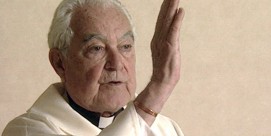Videocast
A century and a half ago, Brigham Young led 600 Mormon settlers to the Salt Lake Valley and predicted it would blossom as a rose. Today, the valley is headquarters to what may be the fastest-growing church in the U.S., blossoming so fast it is continuously redefining itself. More
Opponents, led by the nation’s Roman Catholic bishops, say the FDA’s approval of the abortion pill RU-486 will “further numb our conscience to the violence of abortion.” More
Controversial Episcopal bishop John Spong has retired and published his autobiography. More
A survey conducted by the KANSAS CITY STAR claims the death rate from AIDS among priests is four times that of the general population. But the newspaper’s conclusions and survey methodology have drawn sharp criticism. More
It’s a ritual that has been practiced in the nation’s capital for nearly half a century. For a couple hours a year, government and religious leaders from around the world put politics aside and gather for a morning of prayer. More
According to the Census Bureau, 44 million Americans do not have health insurance. Everyone agrees solving that problem will take more than church volunteers, but take a look at what a devout doctor and Memphis’s Church Health Center are doing. Memphis is one of the poorest big cities in the country, and that’s why Dr. Scott Morris moved there. More
“The greatest thing I can say about being a priest, what I like better than anything else, you belong to everybody. I’ve tried awfully hard to understand human problems and to find the right advice.” More
Christian music, according to the Recording Industry Association of America, is now more popular than jazz or classical, and still growing in popularity. Yet Christian musicians are under vigilant scrutiny from their fans over what they write, where they perform, and how they live their lives. More
An estimated 4 percent of Americans, according to the Princeton Religious Research Center, call themselves atheist, or nonbelievers in God or a universal spirit. We know what they do not believe in, but what does inform their beliefs, and how do their communities regard them? More










